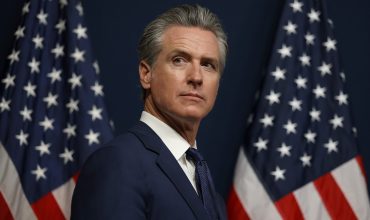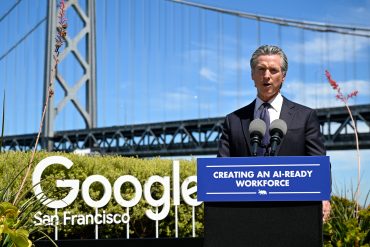
- AI & Regulation
- AI Safety
- Policy & Regulation
California Enacts First U.S. AI Safety Law, Mandating Disclosure
6 minute read

Landmark AI safety regulations require tech giants to disclose risk protocols and report critical incidents within California’s new compliance framework
Key Takeaways
- California enacts first U.S. AI safety law requiring companies like OpenAI, Meta, and Google to publicly disclose safety protocols and report critical incidents within 15 days
- $1 billion damage threshold triggers mandatory compliance measures including third-party audits and risk assessments for AI models that could cause catastrophic harm
- Whistleblower protections established for employees at major AI labs, with California positioning itself as the national leader in AI regulation ahead of potential federal standards
Introduction
California Governor Gavin Newsom has signed groundbreaking legislation that mandates AI companies implement and publicly disclose safety measures to prevent misuse of advanced artificial intelligence models. The Transparency in Frontier Artificial Intelligence Act represents the first comprehensive set of regulations for large-scale AI models in the United States.
The law targets major AI laboratories including OpenAI, Anthropic, Meta, and Google DeepMind, requiring them to establish transparent safety protocols and conduct regular risk assessments. This regulatory framework aims to prevent AI systems from being weaponized for destructive purposes such as creating bioweapons or disrupting critical infrastructure like banking systems.
Key Developments
The legislation establishes specific compliance requirements for AI companies operating advanced models. Companies must report significant safety incidents to California’s Office of Emergency Services within 15 days and maintain public documentation of their safety protocols.
The law defines catastrophic risk scenarios as those likely to cause at least $1 billion in damages or result in over 50 injuries or fatalities. These thresholds trigger mandatory compliance mechanisms including third-party audits, impact assessments, and human oversight systems.
The regulation also establishes whistleblower protections for employees at AI companies and creates reporting mechanisms for both companies and the public to flag potential safety incidents. These requirements exceed current standards outlined in the European Union’s AI Act, positioning California at the forefront of AI governance.

Market Impact
The regulatory framework creates new operational costs for AI companies, particularly affecting smaller firms and startups that must now invest in compliance infrastructure. However, early adoption of these standards may provide competitive advantages as companies prepare for potential federal regulations.
Major technology companies have responded with mixed reactions to the new requirements. While some industry groups, including the California Chamber of Commerce and Chamber of Progress, opposed the legislation due to concerns about regulatory burden, others view the framework as necessary for long-term market stability.
The law makes cloud computing resources more accessible to smaller developers and researchers, potentially leveling the playing field in AI development while ensuring safety standards across the industry.
Strategic Insights
California’s regulatory approach reflects a strategic balance between fostering innovation and ensuring public safety. The legislation incorporates industry feedback to reduce burdens on startups while maintaining robust safety requirements for larger AI operations.
Companies that achieve early compliance may gain advantages in market access and consumer trust, particularly as other states consider similar legislation. New York currently has comparable AI safety bills under consideration, suggesting a potential wave of state-level regulation.
The framework positions California-based AI companies to influence global regulatory standards, potentially shaping international approaches to AI governance. This regulatory leadership could translate into competitive advantages for firms that master compliance early.
Expert Opinions and Data
Industry responses highlight the regulatory tension between innovation and safety oversight. Jack Clark, Anthropic’s policy head, acknowledged the framework’s balanced approach, stating: “While federal standards remain essential to avoid a patchwork of state regulations, California has created a strong framework that balances public safety with continued innovation.”
State Senator Scott Wiener, the bill’s author, emphasized the legislation’s collaborative development process. “With this law, California is stepping up, once again, as a global leader on both technology innovation and safety,” Wiener commented, highlighting the integration of industry feedback to minimize startup burdens.
Sacha Haworth of Tech Oversight California called the law a “key victory” for accountability and whistleblower protection, reflecting broader advocacy support for AI transparency measures. The legislation faced opposition from companies like Meta and OpenAI, with OpenAI publishing an open letter discouraging the governor from signing the bill.
Conclusion
California’s AI safety legislation establishes the nation’s first comprehensive regulatory framework for advanced artificial intelligence systems, creating mandatory disclosure requirements and safety protocols for major technology companies. The law balances innovation incentives with public safety measures through targeted compliance requirements and whistleblower protections.
The regulatory framework positions California as the national leader in AI governance while potentially influencing federal policy development. Companies now face immediate compliance obligations that may impose short-term costs but could provide long-term competitive advantages as AI regulation expands nationwide.








